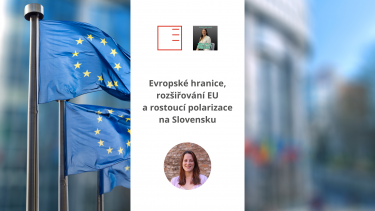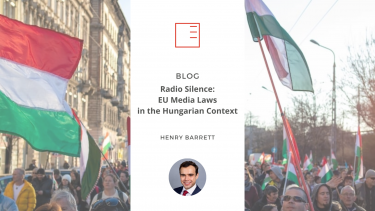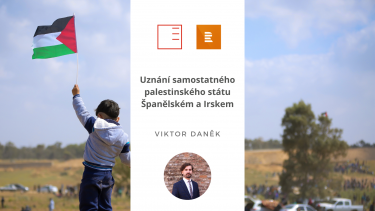Timpul Prezent | European borders, EU enlargement and growing polarization in Slovakia
What are the borders of Europe and how do they coincide with the borders of the European Union? What are the prospects for EU enlargement towards the Western Balkans and the former Soviet states? These questions are addressed by Jana Juzová, senior researcher at EUROPEUM Institute for the Timpul Prezent podcast. She also discussed the consequences of the recent attack on Slovak Prime Minister Robert Fico and highlighted the growing polarization of Slovak society and the potential threat to media independence.
Show moreBLOG | Radio Silence: EU Media Laws in the Hungarian Context
The European Union has passed major legislation to try and secure media freedom and independence in recent years. However, for the state of media pluralism in certain Member States, these efforts have come too late. In the Hungarian context, a pro-ruling party media ecosystem stands well-entrenched in the private and public media sector. Writes our researcher, Henry Barrett, a Fulbright-Schuman Grantee.
Show moreČRo Plus | Spanish and Irish recognition of an independent Palestinian state
Spain and Ireland are working closely together on a joint move towards the recognition of an independent Palestinian state. Recognition is expected to take place on 21 May. They see this move as an expression of support for a two-state solution to the conflict between Israelis and Palestinians. Viktor Daněk, Deputy Director of EUROPEUM Institute, commented on this issue for Czech Radio.
Show morePolicy Paper | 2024 and Beyond: How to Future-proof the Transatlantic Alliance
In their analysis, researchers Danielle Piatkiewicz and Hugo Blewett-Mundy delve into the most recent obstacles confronting transatlantic security, particularly within the backdrop of Russia's war against Ukraine. They emphasize the imperative of addressing geopolitical challenges while simultaneously striving for strategic independence in economic and energy matters, all the while preserving the common democratic principles that unite these allies. The paper also anticipates the upcoming hurdles in 2024, including a significant election year and the necessity for the transatlantic relationship to fortify its determination for the future.
Show more PDFPolicy Paper | 2024 and Beyond: How to Future-proof the Transatlantic Alliance
Our researcher Danielle Piatkiewicz contributed to an analysis looking at the latest obstacles facing transatlantic security, particularly against the backdrop of Russia's war against Ukraine. The focus is on the need to address geopolitical challenges while pursuing strategic independence on economic and energy issues, all while maintaining the common democratic principles that bind these allies together. The document also anticipates the obstacles ahead in 2024, including a significant election year, and the need for the transatlantic relationship to strengthen its resolve for the future.
Show moreBLOG | How can the EU boost the implementation of the Franco-German Proposal? A turning point for Kosovo-Serbia normalisation process
Serbia's refusal to recognise Kosovo, which unilaterally declared independence in 2008, is at the root of many problems within the region of Western Balkan. It hinders both countries’ EU membership paths, creates destabilisation in the Balkans, as visible in the recent unrest in northern Kosovo, and hinders regional economic cooperation. Writes our intern from our Brussel's office Costanza Celoria.
Show moreRTVS: Former Kosovo army leadership on trial in The Hague
Our researcher Jana Juzová told RTVS why former Kosovo president Hashim Thaçi is standing trial in The Hague. The indictment of the special Hague tribunal accuses him of committing several crimes during the war for independence.
Show moreINFO.CZ: Serbia and Kosovo at the same table, but without a result. Instead of a solution, the upcoming agreement brought only more questions
After long negotiations, according to the head of EU diplomacy, Josep Borrell, on Saturday, March 18, the representatives of Serbia and Kosovo agreed on the final form of the agreement, which is supposed to ensure the normalization of relations between the two countries. Serbia does not recognize the independence of its former province, and relations have further escalated over the past year and a half over a dispute over the recognition of identity documents and vehicle registration plates issued by the two entities. The heated atmosphere in the war-torn region has attracted enormous attention from the US and the European Union, and both sides have invested significant efforts towards calming the situation and formulating an agreement to prevent similar situations in the future.
Show moreBLOG | European Media Freedom Act on the case of Slovenia: Has Slovenia overtaken the European Commission with its new law?
In September 2022, the European Commission put forward a proposal for a new media regulator - the European Media Freedom Act. Slovenia is one of the most struggling EU countries in terms of media freedom and independence. In the summer of 2020, the Janša government proposed a media-focused law that would increase the state's influence over Slovenia's national press agency and limit its funding of the public broadcaster RTV. Has Slovenia's new law put the European Commission ahead of the game? That is what our intern Klára Landová discusses in her blog.
Show moreEU MONITOR | From boom to bust: How uncoordinated policies halted solar power deployment in Czechia
In his EU Monitor, Jonathan Lyons writes about the future of solar energy in the Czech Republic. "Harnessing the full potential of solar energy will not only help to meet the EU's decarbonisation targets, but also boost energy security and create local jobs. The potential for solar energy in the Czech Republic is considerable, up to 12 GW," writes Lyons.
Show more PDFStaroměstské náměstí 4/1
Prague 1 - Staré Město
110 00
tel.: +420 212 246 552
email: europeum@europeum.org
https://www.europeum.org









